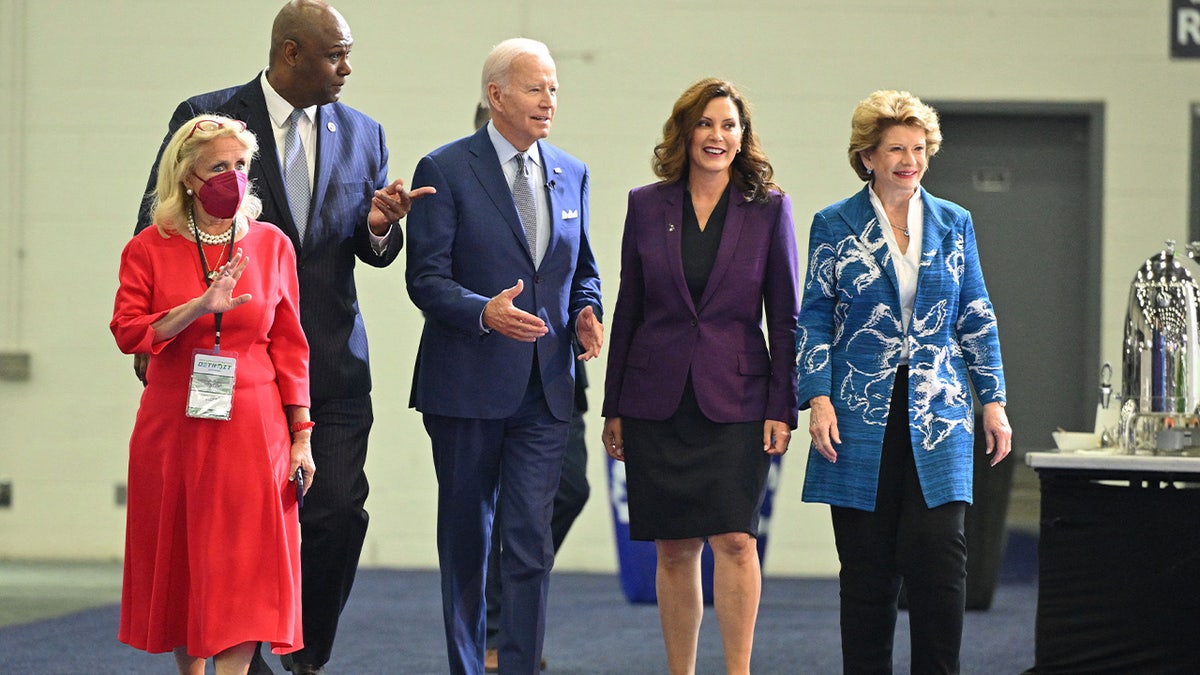House takes key test vote for Johnson’s $95B foreign aid plan after Dems help it advance

The House of Representatives is voting on whether to proceed with Speaker Mike Johnson’s $95 billion foreign aid proposal on Friday after it cleared its first key procedural hurdle with Democratic help.
The Friday morning vote is a test vote of sorts for the four foreign aid bills, known as a 'rule vote.' If successful it will allow lawmakers to debate each of the individual four bills and vote on their final passage on Saturday.
Three of the four bills fund Ukraine, Israel, and the Indo-Pacific. A fourth bill includes national security priorities like the House’s recently passed crackdown on TikTok’s ownership as well as the REPO Act, which would liquidate seized Russian assets and give that funding to Ukraine.
Democrats had to help bail the GOP-led proposals on Thursday night in the face of conservative opposition. The Rules Committee, the final barrier before legislation traditionally gets a House-wide vote, spent all day considering the bills before advancing their 'rules' package in a 9-3 vote.
It’s highly unusual for Democrats, or any opposition party, to cross the aisle on a Rules Committee vote as well as a House-wide rule vote. But it underscores the urgency that lawmakers on both sides feel about sending aid to foreign allies.
The three conservatives on the panel — Reps. Chip Roy, R-Texas, Thomas Massie, R-Ky., and Ralph Norman, R-S.C. — all voted against the measure; an equally unusual move that’s become common in the 118th Congress, where members of the House Freedom Caucus and their allies have wielded outsized influence in Republicans’ thin majority by blocking procedural hurdles such as this. Democrats’ support will be critical for the rule vote and potentially even final passage of the bills.
Johnson has faced furious pushback from the right flank of his conference over most of his plan, particularly sending $60 billion to Ukraine, which has become a politically fraught topic for much of the GOP.
Those same foreign aid hawks have objected to some of the Israel funding being aimed at humanitarian aid in Gaza, though its inclusion was critical to winning Democratic support. In a victory for Republicans, however, it prevents any of the Israel-Gaza funding from going toward the United Nations Relief and Works Agency (UNRWA), a Palestinian refugee agency alleged to have ties to Hamas.
Conservative rebels also decried House GOP leaders’ decision to combine the four bills into one before sending it to the Senate, arguing it amounted to the same $95 billion foreign aid package the Democrat-majority chamber passed earlier this year and which House Republicans oppose. Johnson has argued that packaging them together for the Senate would prevent them from neglecting the Israel bill at a time when the issue has divided the Democratic Party.
Earlier this week, Massie threatened he’d move to oust Johnson from the speakership if he did not step aside after having the House vote on his foreign aid plans. One GOP lawmaker who was present at the closed-door meeting where it happened told Fox News Digital on Tuesday that Johnson challenged him to do so.
Massie is now signed onto Rep. Marjorie Taylor Greene’s motion to vacate resolution, which, if deemed 'privileged' by Greene, would force the House to begin voting on Johnson’s potential ouster within two legislative days.
Some discussion over whether to raise the threshold needed to call a motion to vacate — currently just one member can call for it — ended with Johnson backing off of the controversial move after it enraged GOP rebels and spurred new ouster threats.
Majority Leader Steve Scalise, R-La., suggested to reporters earlier that a wide swath of rank-and-file Republicans supported the idea; but Johnson denied having such conversations earlier on Thursday when asked by Fox News Digital.
'Recently, many members have encouraged me to endorse a new rule to raise this threshold. While I understand the importance of that idea, any rule change requires a majority of the full House, which we do not have. We will continue to govern under the existing rules,' Johnson said on Thursday evening.




